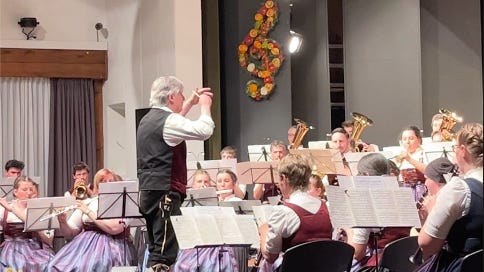Econ: Good Morning, Photographer.
Photog: Good Morning, Economist. Where have you been?
Econ: On holiday.
Photog: Did you have a good rest?
Econ: I got upset.
Photog: Aha. About what?
Econ: About Blasmusik.
Photog: What?
Econ: Brass music. It holds a significant place in German musical culture.
Photog: And you listened to it on your vacation?
Econ: I was in the Allgäu region over Easter. Allgäu is a mountainous region in Bavaria, southern Germany. I attended the Easter concert there by Harmoniemusik Hindelang, the "musical highlight of the year," as the local music association's website calls it. Three of the five pieces from the concert's first part - I left during the intermission - were written by Sepp Tanzer.
Photog: You were upset about brass music?
Econ: I was upset about Sepp Tanzer.
Photog: Who is that?
Econ: Sepp Tanzer was an Austrian composer of brass band music—and presumably what one would call an ardent Nazi supporter.
Photog: Tell me more.
Econ: He was born in 1907 in the Brenner Alps, on the border region between Austria and Italy. Tanzer became a musician in the Wiltener Musikkapelle, Wiltener band, in 1926, its bandmaster in 1935, and applied for membership in Hitler's Nazi Party NSDAP on July 26, 1938. Tanzer renamed his band Gaumusikzug, Gaumusikzug leader, and from then on, he used Gaumusikzugführer, Gaumusikzug leader, instead of bandmaster. Tanzer performed at concerts in SA uniform, with SA standing for Sturmabteilung, which means "Storm Division" or "Storm Troopers," the original paramilitary wing of the Nazi Party in Germany. Tanzer also headed the folk music department of the Reich Music Chamber, was Gaumusikleiter of the Tyrol-Vorarlberg region, and in this role conducted a concert at the meeting between Benito Mussolini and Adolf Hitler at the Brenner Pass on March 18, 1940. Sepp Tanzer was also, and not least, as I said, a composer. When he died on February 28, 1983, in Kramsach, Tyrol, Austria, he had created over 150 brass band compositions.
Photog: Did you learn all that during the concert?
Econ: We come to the crux of the matter.
Photog: What would that be?
Econ: At the concert, each piece was announced by the band's conductor, Christoph Eberle, with brief descriptions of the pieces and the composers. Not a word about Sepp Tanzer's Nazi past. Only words of praise. For example, the song "Tirol 1809," composed by Tanzer in 1952, was described by Eberle as the Tyroleans' fight for freedom against Napoleon. The author's real motivation, namely his hatred of the French, concealed and wrapped in a story from another time to make it less vulnerable to attack, wasn't revealed by Eberle.
Photog: The listeners were left in the dark about Sepp Tanzer's past and his motives.
Econ: Exactly. Whether one can separate the work from its author—in this case, between the composition and the composer is controversial. Whether works by composers like Sepp Tanzer should be performed. But there's any question at all about whether one can hold a moderated brass band evening in Germany in 2025 without mentioning a single word about the Nazi past of the composers whose pieces are being performed. You simply can't.
Photog: I agree, Economist.
Econ: If we don't know our past, we lack the understanding and tools in the present to defend ourselves against those who prefer authoritarianism to democracy. Those who sow hatred to reap power. Brass music could provide knowledge and tools. This opportunity was missed at the Easter concert in Bad Hindelang.
Photog: Apart from that, did you have a good time?
Econ: I hiked a lot. The region is wonderful. Mountains, forests, rivers, lakes. And delicious food.
Photog: At least.
Econ: At least.
Photog: See you in Democracy, Economist.
Econ: See you in Democracy, Photographer.
Who are Econ and Photog? ……… 🚶♀️🚶🏽




